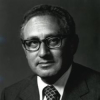Henry A. Kissinger

Henry A. Kissinger
Henry Alfred Kissingeris an American diplomat and political scientist. He served as National Security Advisor and later concurrently as United States Secretary of State in the administrations of presidents Richard Nixon and Gerald Ford. For his actions negotiating the ceasefire in Vietnam, Kissinger received the 1973 Nobel Peace Prize under controversial circumstances, with two members of the committee resigning in protest. Kissinger later sought, unsuccessfully, to return the prize. After his term, his advice has been sought by world leaders...
NationalityGerman
ProfessionStatesman
Date of Birth27 May 1923
CountryGermany
We had a very interesting and positive discussion, and I appreciate the opportunity to meet with several of the key staff members of the governor's staff, ... A few weeks ago I stood with the governor when I spoke about present events and nuclear strategy, and my impression is we share very compatible views.
People are now starting to explain the Cold War. Even in the crises at that time the survival of millions of people was at stake. And we (the USA) had to threaten the other super power with retaliation to prevent it from doing something to us. Today we live in a world in which a lot of things are in flux. That creates a lot of fear. But it is also a time of great opportunity. And I would call on today's statesmen to not allow their thinking to be directed by fear.
I had an opportunity to express my views, yes. I agreed with the approach which we took, namely, to make a distinction between the loss of life of the Chinese pilot and our military operations outside territorial waters or territorial limits.
I want to get into the President's head some idea of what he can do. If military actions are recommended to him for decision, I want him to know what he is doing when he decides.
Congress can't do much more damage to us than they already have. To this extent we're liberated to do what is right. ... Our successors will be living in a nightmare if we don't do what is right.
an occasion to blow off their frustrations on an issue on which they didn't look as if they are begging (the United States) for help.
a review of withdrawal strategy ... seems in order.
My heart goes out to the president because I've served in an administration that faced a very divided country in a very difficult set of circumstances.
Because of the axiom that guerrillas win if they do not lose, stalemate is unacceptable, ... the military challenge in Iraq is more elusive.
Ninety percent of all politicians give the other ten percent a bad reputation.
I'm confident John Bolton will bring peace to the world before he brings peace to his relations with The New York Times,
We will go where the facts lead us,
If you don't know where you are going, every road will get you nowhere.
We'll do it in the quickest way possible that is compatible with foreigners and making sure that when the report is finished, there can be no question about the fact that every aspect has been explored, ... Late Edition With Wolf Blitzer.